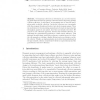94 search results - page 7 / 19 » Generational Real-Time Garbage Collection |
115
Voted
SIGMETRICS
2004
ACM
15 years 8 months ago
2004
ACM
This paper explores and quantifies garbage collection behavior for three whole heap collectors and generational counterparts: copying semi-space, mark-sweep, and reference counti...
118
Voted
OOPSLA
2005
Springer
15 years 8 months ago
2005
Springer
Garbage collection yields numerous software engineering benefits, but its quantitative impact on performance remains elusive. One can compare the cost of conservative garbage col...
110
click to vote
CC
2005
Springer
15 years 8 months ago
2005
Springer
Abstract. Generational collectors are well known as a tool for shortening pause times incurred by garbage collection and for improving garbage collection efficiency. In this paper,...
121
click to vote
IWMM
1992
Springer
15 years 6 months ago
1992
Springer
Abstract. Automatic storage management is important in highly parallel programming environments where large numbers of objects and processes are being constantly created and discar...
142
Voted
IWMM
2007
Springer
15 years 8 months ago
2007
Springer
Past studies have shown that objects are created and then die in phases. Thus, one way to sustain good garbage collection efficiency is to have a large enough heap to allow many ...


